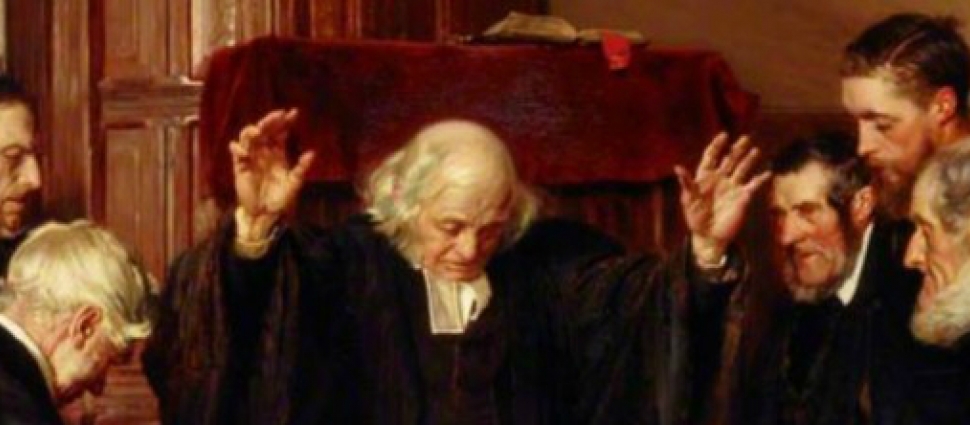James Durham on Ministerial Qualifications (4)

Apr 14, 2016
 Discerning readers of this short series on "Concerning Ministerial Qualifications" may be wondering whether James Durham missed the foundational qualification the New Testament outlines for ministry. After all where does Paul begin in outlining the qualifications for elders? He begins with character. He begins with who a man is in himself, and how he leads his household. Only then does he move on to ability to teach (1 Tim. 3:1-7; Titus 1:5-9). But, fear not, Durham did not miss this emphasis.
Discerning readers of this short series on "Concerning Ministerial Qualifications" may be wondering whether James Durham missed the foundational qualification the New Testament outlines for ministry. After all where does Paul begin in outlining the qualifications for elders? He begins with character. He begins with who a man is in himself, and how he leads his household. Only then does he move on to ability to teach (1 Tim. 3:1-7; Titus 1:5-9). But, fear not, Durham did not miss this emphasis. Though he began with the necessity of “gifts” and “learning” to qualify a man for the ministry he spent the largest portion of his essay on the importance of “grace,” that is, that a minister be a man of evident godliness (Revelation, 255-265). As we will see, Durham, is at one with Robert Murray M’Cheyne in saying “A holy minister is an awful weapon in the hand of God.” (Andrew A. Bonar, ed., Memoir and Remains of Robert Murray M’Cheyne [1892; repr., Edinburgh: Banner of Truth, 1966], 282)
Holiness Necessary
Durham was clear, then, that grace is necessary for the ministry. By this he simply meant: “he that thus carrieth the Lord’s message … should be holy.” While a man being devoid of “saving grace” and “true regeneration” did not invalidate the work of the ministry performed (we are not Donatists) nonetheless “holiness is a qualification … it is useful and necessary in many respects.”
Durham argued this from many angles. But just to highlight two. He noted that a key role of a minister is to pray for his people “as in Paul’s practice is manifest.” And then he simply asked, “what can the unrenewed Minister do here?” The answer is obvious, an unregenerate minister “is unable to be profitable in this respect.” Again Durham highlighted the importance of application in preaching, and in particular being able to comfort the “weary.” He notes that an unregenerate minister is unable to “sympathise” with his people truly, and therefore unfit to pastor them.
Holiness Should be Examined
Given the importance of holiness, Durham was insistent that a large part of the ordination process should be geared towards considering the holiness of the ministerial candidate. Durham notes that “this qualification of holiness should be greatly respected in a people’s choosing a minister, and in a Presbyteries ordaining of one for a congregation.” To neglect this is “exceedingly faulty.”
Now Durham was clear that a church or a Presbytery should not “search in extraordinary ways for knowing a man’s conversion … or that any particular evidences should be pitched on without which nothing is to be satisfying.” But the Presbytery must be clear that there is sufficient evidence “in a discerning charity” that the man before them is a man of God.
Durham considered many objections to this, that it would foster pride in those who “get through” the process etc. One objection he dwelt on is that this approach might mean less ministers are ordained leaving “many congregations desolate.” To this objection Durham turned in reply to the words of “that great pattern and patron of learning and piety,” Robert Boyd of Trochrig, who stated that “it is not so much to be respected how many be in the ministry, but who, or of what qualifications they be.”
Durham (rightly) insisted that the Presbytery cannot be indifferent to whether they are ordaining a friend of an enemy of Jesus Christ to the ministry. To proceed to ordain an “ignorant or unfaithful guide” is a “cruel betraying of poor souls.” Durham again quoted Robert Boyd and his censure of “the preposterous moderation of some good men” who are “too charitable in admission of men to the Ministry.” (Though Durham again cautioned that “there is no infallibility expected nor pretended unto”.)
Holiness Should be Evident
So holiness is necessary and it should be examined prior to ordination. But what does it look like? Durham gave five positive requirements. First, holiness is evidenced by ruling a household well (1 Tim. 3:4-5). While this requirement does not preclude ordaining young men it does highlight that there can be “more confidence to discern a called minister” when a man is older. Second, he is to evidence Christian piety. That is, he is to be vigilant, sober, blameless, of good behaviour, given to hospitality, not greedy or covetous (1 Tim. 3:3; Titus 1:7-8). Third, he is to have a good report of those outwith the church (1 Tim. 3:7). Fourth, he is to be a lover of good men (Titus 1:8). That is, the man will already be known for his love to the people of God. Fifth, he is not to be a novice (1 Tim. 3:6). There should be a firm and stable profession and life of godliness prior to ordination.
These fruits take time to evidence themselves, and as such we should “lay hands on no man suddenly” (1 Tim. 5:22).
Conclusion
Well, in this short series we have seen the need for a gifted ministry, an educated ministry, and now finally a holy ministry. The ascended Lord has promised to give gifts to men (Eph. 4:8) including pastors and teachers. May we all pray that the Lord would gift to the church a generation of gifted, educated, but above all holy men. For as we began, “In a great measure, according to the purity and perfections of the instrument, will be the success.” (M’Cheyne, Memoirs, 282)





